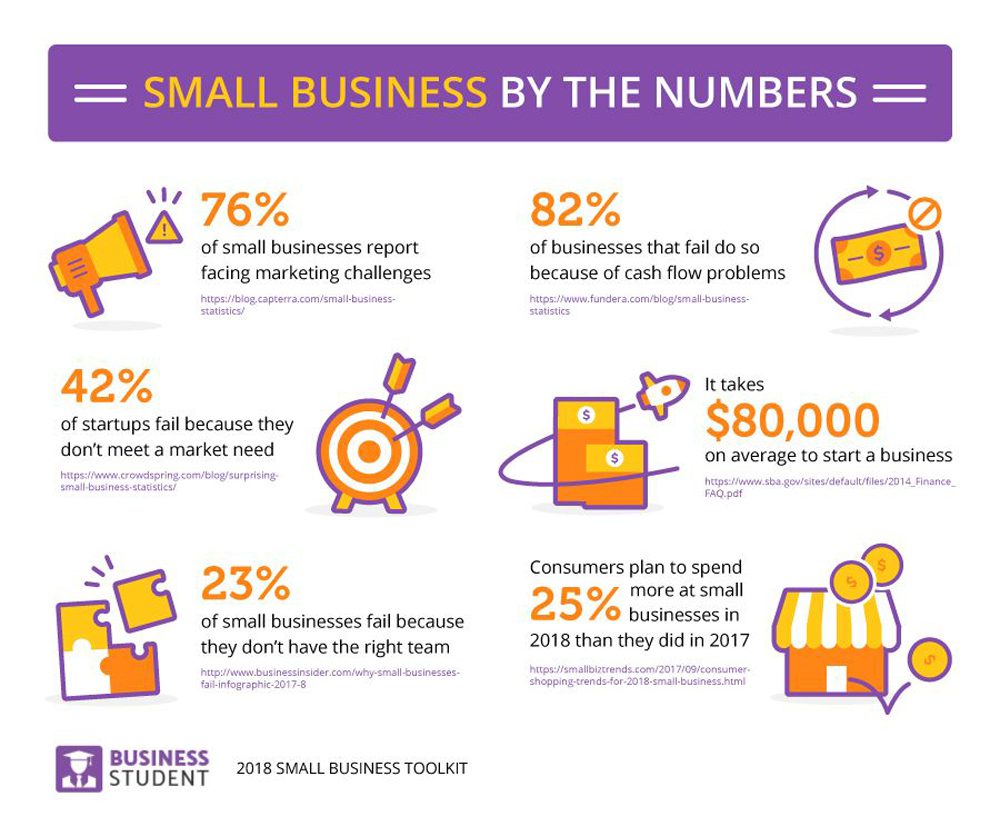
With National Small Business Week (celebrated the first week of May) as its backdrop, there are multiple stories about the success people have in participating in the “Gig Economy”—a record 55 million people who are freelancing and working remotely, with technology being added that allows for individuals to start their own company.
But while we hear about the successes, there are millions who have faltered.
When it comes to “Small Business by the Numbers,” produced by BusinessStudent.com, here are some stats worth considering:
• 76 percent of small businesses report facing marketing challenges
• 82 percent of businesses that fail do so because of cash flow problems
• 42 percent of startups fail because they don’t meet a market demand
• 23 percent of small businesses fail because they don’t have the right team
Thankfully, there are steps someone who has a vision for starting and operating a small business can take.
In its 2018 Small Business Tool Kit, BusinessStudent.com has outlined the most common reason startups fail and how to overcome those obstacles.
Among the highlights:
The lack of a business plan
Almost half of all businesses fail because they don’t even meet a business need. For that reason alone, it’s imperative that you meet an actual need and write a business plan that will answer that question. Some needs are simple, such as whether a restaurant fills the need for a convenient food, a night out, or even a unique experience.
Consider talking to potential customers or running a test group to determine whether there’s a market need for your idea.
Start-up funds
With the average small business costing $80,000 to start it’s no surprise that nearly a quarter of prospective small business owners simply can’t raise the money they need.
Check out any government small business loans you might qualify for, with the Small Business Administration’s website being a good start. A conversation with your local Chamber of Commerce might also be helpful.
Marketing challenges
Some of the most prominent marketing challenges small businesses encounter include:
• not enough resources
• having low visibility and a lack of leads
• lack of social media expertise
• failing to produce enough or the right kind of content
One of the solutions to these is to reach out, to your local Chamber of Commerce or even online. Resources are available through BusinessStudent.com to check out free online courses that could be a good start toward filling that gap.
Recruiting challenges
Finding the right talent is a constant challenge for small businesses, with 25.7 percent of organizations in the range of five and nine employees citing this as a major issue.
A strategy that includes presenting elements of the business plan mentioned earlier is one idea experts offer as a way to recruit.
Keeping employees happy
Once a small business owner has assembled the team, keeping them happy is the next order of business.
A critical element in that strategy is resisting the temptation to micromanage staff.
Essentially what experts are advising is to trust your employees to run the business the same way you trust yourself.
And then there’s the question of pay. While going “above and beyond” when it comes to salary, health care packages and retirement benefits might feel like it hurts the bottom line, it will keep your best people happy and boost morale. Being competitive pays off in the long run.









